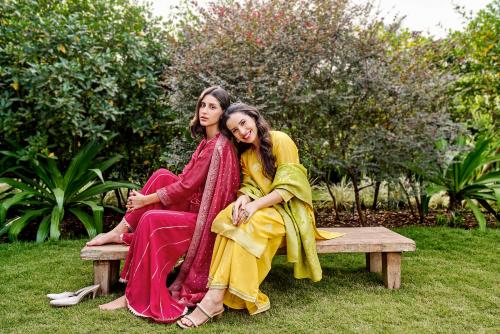Mastering Colour: Choosing The Right Hues For Your Ethnic Outfits

Colour plays a pivotal
role in the world of fashion, evoking emotions, setting moods, and making
powerful style statements. When it comes to ethnic outfits, selecting the right
hues can elevate your ensemble from ordinary to extraordinary, enhancing your
overall look and creating a lasting impression. In this comprehensive guide,
we'll delve into the art of choosing the right hues for your ethnic outfits,
exploring colour theory, cultural significance, and practical tips to help you
master the art of colour coordination and express your unique sense of style.
Understanding Colour
Theory:
Before we dive into the nuances of choosing the right hues for your ethnic outfits, it's essential to understand the basics of colour theory. Colours are typically classified into three primary categories: warm, cool, and neutral. Warm colours, such as reds, oranges, and yellows, are associated with energy, vitality, and warmth, while cool colours, such as blues, greens, and purples, evoke a sense of calmness, serenity, and sophistication. Neutral colours, such as whites, greys, and browns, serve as versatile bases that complement and balance other hues.
Consider Your Skin Tone:
One of the most critical factors to consider when choosing the right hues for your ethnic outfits is your skin tone. Skin tones can be broadly categorized into warm, cool, or neutral undertones. Warm undertones are characterized by yellow, peach, or golden hues, while cool undertones have pink, blue, or red undertones. The blend of cool and warm tones with neutral undertones is well-balanced. To determine your skin tone, examine the veins on your wrist: green veins indicate warm undertones, blue veins suggest cool undertones, and a mix of green and blue veins suggests neutral undertones.
Once you've identified
your skin tone, you can select complementary colours that enhance your natural
complexion and flatter your features. For warm undertones, earthy tones such as
rust, terracotta, and mustard complement beautifully, while cool undertones are
accentuated by jewel tones such as emerald green, sapphire blue, and amethyst
purple. Neutral undertones have the versatility to wear a wide range of hues,
from soft pastels to rich neutrals, without overwhelming their complexion.
Understand Cultural
Significance:
In addition to personal
preferences and skin tone considerations, it's essential to understand the
cultural significance of colours when choosing hues for your ethnic outfits.
Different cultures and traditions attach specific meanings and symbolism to
various colours, influencing their use in traditional attire and ceremonies.
For example, red is considered auspicious and symbolizes love, prosperity, and
happiness in many Asian cultures, making it a popular choice for bridal and
festive attire. Similarly, white is associated with purity and peace in Western
cultures but may signify mourning or funerals in some Eastern cultures.
When selecting hues for
your ethnic outfits, be mindful of the cultural context and symbolism
associated with different colours. Choose colours that resonate with your
heritage, values, and personal beliefs while respecting the traditions and
customs of the community. Incorporating culturally significant colours into
your ensemble not only adds depth and authenticity but also pays homage to your
cultural heritage and identity.
Embrace Colour
Psychology:
The study of color's effects on perception,
behavior, and emotions in people is known as color psychology. Different hues
evoke specific feelings and emotions, influencing our mood and mindset in
subtle yet significant ways. When choosing hues for your ethnic outfits,
consider the psychological impact of colours and how they align with the mood
or occasion. For example, vibrant and bold hues such as reds and oranges exude
energy, passion, and confidence, making them perfect for festive celebrations
and special occasions. In contrast, soft and soothing hues such as blues and
greens evoke a sense of calmness, tranquillity, and harmony, ideal for casual
gatherings and everyday wear.
Experiment with different
colour combinations and palettes to create the desired mood or atmosphere for
your outfit. Mix and match complementary colours for a harmonious and balanced
look, or opt for contrasting hues for a bold and dynamic statement. Whether
you're aiming for a vibrant and eclectic ensemble or a serene and understated
look, understanding colour psychology can help you achieve the desired
aesthetic and express your personality with confidence.
Practical Tips for
Choosing Hues:
In addition to
understanding colour theory, cultural significance, and colour psychology, here
are some practical tips for choosing the right hues for your ethnic outfits:
Play with Contrast:
Experiment with contrasting hues to create visual interest and dimension in
your ensemble. Pair bold, saturated colours with softer neutrals or pastels to
highlight focal points and create balance.
Mix and Match Textures: Incorporate different textures and fabrics in complementary hues to add depth and richness to your outfit. Mix smooth silk sarees with textured brocade blouses or embellished dupattas with simple cotton kurtas for a sophisticated and multidimensional look.
Consider the Occasion:
Tailor your colour choices to the occasion or event you're attending. Opt for
vibrant and festive hues for weddings, festivals, and celebrations, while
choosing muted or subdued tones for formal events or sombre occasions.
Accessorize Wisely:
Use accessories such as jewellery, scarves, and handbags to add pops of colour
and personality to your outfit. Experiment with statement accessories in bold
hues to complement or contrast with your ethnic attire and elevate your look.
Trust Your Instincts:
Ultimately, choosing the right hues for your ethnic outfits is a personal and
intuitive process. Trust your instincts and select colours that resonate with
your style, personality, and mood, allowing you to express yourself
authentically and confidently.
Choosing the right hues for your ethnic outfits is an art form that requires a combination of creativity, cultural awareness, and personal style. By understanding colour theory, considering your skin tone, embracing cultural significance, and incorporating practical tips, you can master the art of colour coordination and create stunning ensembles that reflect your unique sense of style and individuality. Whether you're dressing for a festive celebration, a formal event, or a casual outing, let colour be your guide and express yourself boldly and beautifully with the hues that speak to your soul.
Post Your Ad Here




Comments (1)
Oyegifts9
Online Gifts Delivery
Enhance your ethnic style by mastering color combinations—choose the perfect hues to complement your outfit and make a stunning fashion statement